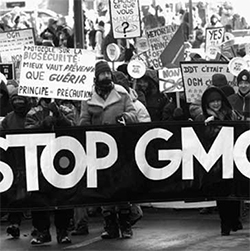
Monsanto Tribunal Judges Slam Monsanto Over Violation of Human Rights
Today the five international judges for the Monsanto Tribunal presented their legal opinion, which include key conclusions, both on the conduct of Monsanto and on the need for important changes to international laws governing multinational corporations.
The judges conclude that Monsanto has engaged in practices that have impinged on the basic human right to a healthy environment, the right to food and the right to health. Additionally, Monsanto’s conduct has a negative impact on the right of scientists to freely conduct indispensable research.
April 18, 2017 | Source: Sustainable Pulse | by
Today the five international judges for the Monsanto Tribunal presented their legal opinion, which include key conclusions, both on the conduct of Monsanto and on the need for important changes to international laws governing multinational corporations.
The judges conclude that Monsanto has engaged in practices that have impinged on the basic human right to a healthy environment, the right to food and the right to health. Additionally, Monsanto’s conduct has a negative impact on the right of scientists to freely conduct indispensable research.
The judges also conclude that despite the development of regulations intended to protect the environment, a gap remains between commitments and the reality of environmental protection. International law should now precisely and clearly assert the protection of the environment and establish the crime of ecocide. The Tribunal concludes that if ecocide were formally recognized as a crime in international criminal law, the activities of Monsanto could possibly constitute a crime of ecocide.
In the third part of the advisory opinion, the Tribunal focuses on the widening gap between international human rights law and corporate accountability. It calls for the need to assert the primacy of international human and environmental rights law. A set of legal rules is in place to protect investors’ rights in the frame of the World Trade Organization and in bilateral investment treaties and in clauses in free-trade agreements.
